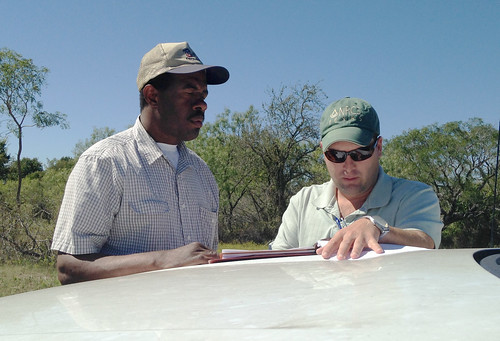One central Texas rancher is fulfilling a childhood dream. Rickie Roddy bought his first cow when he was 14 years old. By the time he was 19, he had grown his herd to 13 head of cattle.

Rickie Roddy (left) of McLennan County Texas has worked closely with the Natural Resources Conservation Service on a conservation plan on conservation practices ranging from pasture planting to establishing water sources for his cattle herd. - See more at: http://blogs.usda.gov/2014/12/23/usda-helps-a-texas-rancher-reach-his-dream-of-operating-a-successful-ranch/#sthash.YmB9qfzs.dpuf
Rickie Roddy (left) of McLennan County Texas has worked closely with the Natural Resources Conservation Service on a conservation plan on conservation practices ranging from pasture planting to establishing water sources for his cattle herd.
“I have always been fascinated by cattle,” Roddy said. “I didn’t know if I was ever going to be able to have any land, but I wanted to be a rancher since I was a little kid.”
Roddy grew up on two acres his parents owned near Waco, Texas, but that didn’t stop Roddy from raising cattle. He would talk people into letting him graze empty lots and also lease small tracts of land for his cows.
As a young man, Roddy married and bought a house with 13 acres in McLennan County. He slowly bought neighboring acreage as it became available. Today, he owns more than 300 acres where he runs his herd of 40 cows that are a cross between Angus and Hereford.
Recently, Roddy was looking for some expert advice on how to improve the production of forage, or food, on his ranch. This led him to a nearby office of USDA’s Natural Resources Conservation Service, (NRCS).
“I had heard people talk about the NRCS before and the type of assistance they could offer landowners,” Roddy said.
Working alongside Jeff Brister, NRCS soil conservationist, Roddy developed a conservation plan to serve as a roadmap toward accomplishing his goals. When Roddy walked into the NRCS office, he was thinking they might look at clearing some brush clearing and planting grass. A couple site visits later, Roddy had developed an aggressive improvement plan that included pasture planting to improve forage diversity and density, cross fencing for rotational grazing, brush management, along with developing water sources for the herd.
To help meet his goals, Roddy learned he was also eligible for financial assistance through the Environmental Quality Incentives Program. The funding came through USDA’s StrikeForce for Rural Growth and Opportunity, an initiative to focus high-priority assistance in rural communities in 20 states, including Texas, with a special emphasis on historically underserved farmers, ranchers and communities in counties with persistent poverty. McLennan County is one of 96 counties in Texas that are part of the initiative.
With the funding assistance, Roddy will be able to fulfill all his conservation plans for his land. Roddy said everything on the land was old and worn out when he bought it. He has a full time job, but works on his ranch on evenings and weekends repairing fences and barns and clearing out old junk. His kids, ages 21, 12 and 8 enjoy helping every chance they get.
“These land improvements that NRCS is helping me with are really going to make the place look nice and help me achieve my stocking rate goals,” Roddy said.
“My dream is becoming a reality, and that’s a pretty neat thing,” he added. “It makes me feel good to think this is a legacy I can leave for my kids someday.”
Source:usda.gov